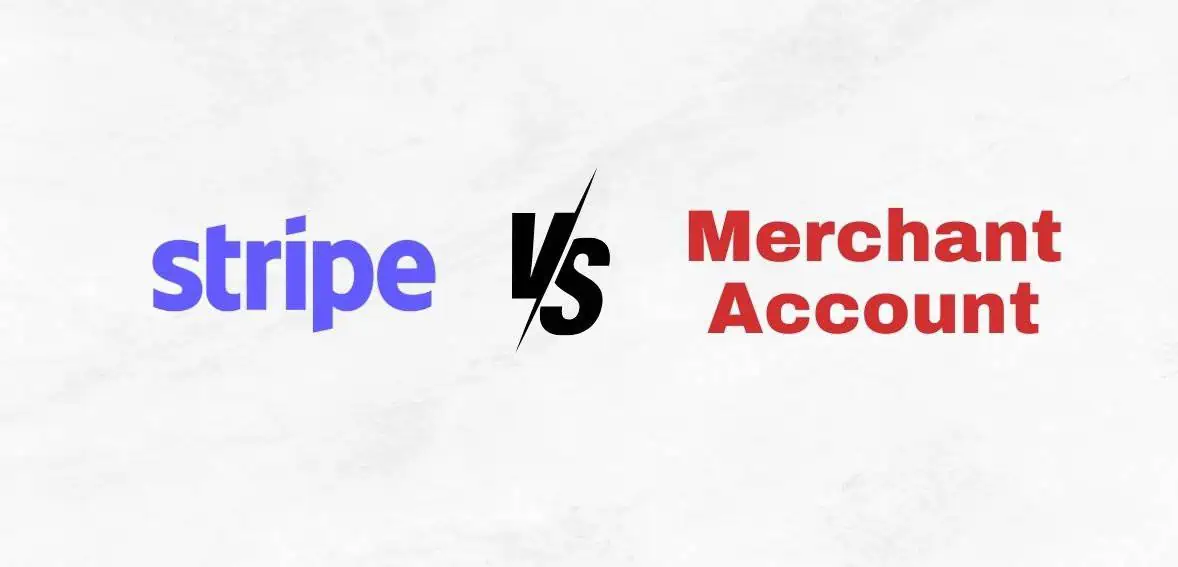Stripe and merchant accounts are payment processing solutions businesses can use to accept payments. Stripe is an all-in-one payment processing platform that offers payment processing, payment gateway, and merchant account services, while a merchant account is a component of a payment processing solution that enables businesses to accept credit and debit card payments. Stripe is known for its simplicity and easy-to-use API, while a merchant account may require more technical expertise to set up and integrate with a payment gateway.
Are They The Same?
Stripe and merchant accounts are not the same. Stripe is a comprehensive payment processing platform, while a merchant account is a specialized account used for processing electronic payments.
What is Stripe?
Stripe is a technology company that provides online payment processing solutions for businesses and individuals. Founded in 2010 by John and Patrick Collison, Stripe has become one of the most popular payment platforms globally, serving millions of users and facilitating billions of dollars in transactions.

Stripe’s primary focus is to make it easy for businesses to accept payments online and manage their online transactions. The platform supports various payment methods, including digital wallets such as Apple Pay and Google Pay, credit cards, and debit cards.
Features and services offered by Stripe:
- Payment processing: enables businesses to accept payments from customers worldwide, supporting over 135 currencies and various payment methods.
- Subscription billing: It offers recurring billing solutions for businesses with subscription-based models, making it easy to manage and automate subscription payments.
- Connect: The Stripe Connect platform allows businesses to create and manage payment platforms for their marketplace, enabling them to facilitate payments between customers and service providers.
- Invoicing: It provides invoicing tools that help businesses create, send, and manage invoices, as well as automate recurring invoices for subscription services.
- Fraud detection: Stripe’s advanced fraud detection system, Radar, helps protect businesses from fraudulent transactions by utilizing machine learning algorithms to identify and block suspicious activities.
- Mobile payment support: Its mobile SDKs (Software Development Kits) enable businesses to integrate payment processing into their mobile applications, supporting Android and iOS platforms.
- Financial reporting: It provides comprehensive financial reporting and analytics tools that help businesses monitor and analyze their transaction data, enabling them to make informed decisions based on their financial performance.
- API and integration: Stripe’s API (Application Programming Interface) allows developers to integrate the platform into their applications and services easily. Additionally, Stripe offers integrations with popular e-commerce platforms and business tools, such as Shopify, WooCommerce, and QuickBooks.
- Payouts: It offers flexible payout options for businesses, allowing them to send funds to their bank accounts or debit cards on a schedule that suits their needs.
- Compliance and security: It is PCI DSS (Payment Card Industry Data Security Standard) compliant and employs strong encryption to ensure the security of sensitive customer data. Furthermore, the company helps businesses navigate complex international compliance requirements, such as GDPR and PSD2.
Stripe as a Payment Facilitator and Payment Service

1. Payment Facilitator (PayFac)
As a PayFac, Stripe simplifies the experience of accepting payments for merchants by offering:
a. Streamlined Onboarding Process: Merchants can quickly and easily set up their Stripe accounts to start processing payments, reducing barriers to entry for new businesses.
b. Aggregated Merchant Accounts: Instead of requiring individual merchant accounts, Stripe pools multiple businesses together. This approach simplifies underwriting, lowers fees, and increases accessibility for businesses of all sizes.
c. Seamless Integration: Merchants can effortlessly connect their Stripe accounts to various shopping carts and e-commerce platforms, enabling a smooth customer payment process.
2. Payment Service Provider (PSP)
As a PSP, Stripe provides a suite of services to ensure a secure and efficient payment experience:
a. Secure Payment Processing: Stripe processes transactions securely, protecting sensitive information and ensuring a safe experience for merchants and customers.
b. Fraud Prevention: With advanced fraud prevention tools, Stripe helps businesses identify and prevent fraudulent activities, minimizing the risk of financial losses.
c. Multi-Currency Support: To cater to a global market, Stripe allows businesses to accept different currencies and payment methods, enabling them to reach a wider audience.
d. Regulatory Compliance: Stripe adheres to strict regulations and guidelines, ensuring its services are reliable, secure, and trustworthy.
3. Innovation and Customer Support
Stripe’s dedication to continuous improvement and customer satisfaction sets it apart from its competitors:
a. Continuous Innovation: Stripe constantly invests in research and development to improve its services, making it a go-to choice for businesses seeking an advanced and reliable payment solution.
b. Customer Support: Stripe’s commitment to providing excellent customer support ensures businesses can rely on their services and receive assistance whenever needed, further solidifying its position as a trusted payment processing solution in the digital age.
Stripe’s range of features and services makes it a comprehensive solution for businesses looking to accept and manage online payments and streamline their financial operations.
What is a Merchant Account?

A merchant account is a bank account that enables businesses to accept and process electronic payment transactions, such as credit and debit card payments. It acts as an intermediary between the business and the customer’s issuing bank, facilitating funds transfer during a transaction. The accounts are essential for businesses that want to accept card payments, whether in-person or online.
Overview of a Merchant Account
When a customer makes a payment using their credit or debit card, the transaction information is sent to the merchant’s payment processor, which then forwards it to the customer’s issuing bank. The issuing bank verifies the transaction details and confirms whether the customer has sufficient funds or credit. If the transaction is approved, the issuing bank transfers the funds to the merchant account. The funds are typically held in the merchant account briefly before being transferred to the business’s primary bank account.
Features and Services Offered by a Merchant Account:
- Payment processing: A merchant account enables businesses to accept various payment methods, such as credit cards, digital wallets like Apple Pay or Google Pay, and debit cards.
- Transaction security: The account typically provides security features to protect sensitive customer data and reduce the risk of fraud, including encryption and tokenization of payment information.
- Fraud prevention: Many account providers offer fraud prevention tools and services, such as real-time transaction monitoring, custom rules, and alerts to help businesses identify and block suspicious activities.
- Chargeback management: These accounts usually come with chargeback management services that help businesses handle and dispute chargebacks, which occur when a customer disputes a transaction and requests a refund from their issuing bank.
- Reporting and analytics: These accounts often include reporting and analytics tools, allowing businesses to track their sales, monitor transaction data, and make data-driven decisions to improve their operations.
- Multi-currency processing: Some accounts enable businesses to accept payments in multiple currencies, allowing them to reach customers worldwide and expand their market presence.
- Customer support: The providers typically offer support services to assist businesses with technical issues, account management, and payment processing inquiries.
- Payment gateway integration: It is often linked to a payment gateway, a service that securely transmits transaction data between the business’s website or point-of-sale system and the merchant account. Many merchant account providers offer seamless integrations with popular e-commerce platforms and payment gateways.
A merchant account is essential to a business’s payment processing infrastructure, enabling them to accept and manage electronic payments securely and efficiently.
Differences between Stripe and Merchant Accounts
While Stripe is a comprehensive payment processing platform, a merchant account is a specialized bank account that enables businesses to accept electronic payments. Here are some key differences between Stripe and merchant accounts:
- Payment processing and transaction fees
Stripe: Stripe charges a flat fee per transaction (usually a percentage of the transaction amount plus a fixed amount). It does not require businesses to set up a separate merchant account, as it aggregates transactions from multiple merchants into its master account. This simplifies the fee structure and makes it easier for businesses to start accepting payments.
Merchant Account: Businesses often face a more complex fee structure with a merchant account. This can include setup fees, monthly fees, per-transaction fees, and additional fees based on factors such as transaction volume, risk profile, and industry type. The fees can vary depending on the merchant account provider and the specific terms of the account.
- Integration and customization
Stripe: Stripe offers a robust API and SDKs for developers to easily integrate and customize payment processing in websites, mobile apps, and other applications. It also provides pre-built integrations with popular e-commerce platforms, such as Shopify and WooCommerce.
Merchant Account: Integrating a merchant account with a website or mobile app usually requires connecting it to a payment gateway, which may involve additional fees and setup. Customization options might be more limited than with Stripe, depending on the merchant account provider and payment gateway used.
- Risk and fraud management
Stripe: Stripe includes its advanced machine learning-based fraud detection system, Radar, which helps businesses identify and block fraudulent transactions. It also offers 3D Secure authentication for added security.
Merchant Account: Fraud prevention and risk management features may vary depending on the merchant account provider. Some providers offer robust fraud detection tools, while others might only provide basic security features. Businesses may need to invest in additional services or third-party tools to achieve a comparable level of fraud
- Payouts and account management
Stripe: Stripe offers flexible payout options, allowing businesses to choose the frequency and method of payouts (e.g., daily, weekly, or monthly). The Stripe Dashboard provides an easy-to-use interface for managing transactions, subscriptions, and reporting.
Merchant Account: Payout schedules and options for merchant accounts can vary based on the provider and account terms. Account management interfaces may also differ, with some providers offering more user-friendly platforms than others.
- Support and customer service
Stripe: Stripe provides extensive documentation, a searchable knowledge base, and responsive email support for its users. Priority and phone support are available at additional costs or for users with higher transaction volumes.
Merchant Account: Customer service quality can vary significantly among merchant account providers. Some offer dedicated account managers, phone support, and 24/7 assistance, while others might only provide limited support channels or hours of availability.
Which one to choose?
When deciding whether to choose Stripe or a merchant account, businesses should consider several factors, such as their transaction volume, integration needs, risk management requirements, and the required level of support.
The pros and cons of both options, along with recommendations based on different scenarios:
Pros and Cons
Stripe Account
Pros:
- Straightforward fee structure
- Easy integration with websites and mobile apps
- Advanced fraud detection system (Radar)
- Flexible payout options
- Robust API and customization options
- Pre-built integrations with popular e-commerce platforms
Cons:
- Transaction fees may be higher for some businesses, especially those with large transaction volumes
- Limited phone support unless on a higher pricing tier
Merchant Account
Pros:
- Potentially lower fees for businesses with high transaction volumes, depending on the provider and account terms
- May offer more personalized support and account management, depending on the provider
Cons:
- Complex fee structure with setup fees, monthly fees, and per-transaction fees
- Integration with websites and apps usually requires a payment gateway, which can involve additional fees and setup
- Fraud detection and risk management features may vary, and additional tools may be needed
- Payout schedules and options may be less flexible
Recommendations based on different scenarios:
- Startups and small businesses: For businesses with lower transaction volumes or those just starting, Stripe is a more straightforward and user-friendly option, offering easy integration, comprehensive fraud protection, and flexible payouts.
- Businesses with high transaction volumes: For businesses processing a high volume of transactions, negotiating a custom fee structure with a merchant account provider may result in lower overall costs. However, businesses should also consider the ease of integration and the quality of fraud prevention tools when deciding.
- Businesses with complex integration need: Stripe’s robust API and SDKs make it an ideal choice for businesses that require custom integrations with websites, mobile apps, or other applications. Stripe’s pre-built integrations with popular e-commerce platforms can simplify the setup process.
- Businesses with high fraud risk: Stripe’s advanced fraud detection system, Radar, provides high protection against fraudulent transactions. If a business operates in a high-risk industry or experiences frequent fraud, Stripe may be the better choice.
- Businesses with a strong focus on customer service: If personalized support and account management is crucial, they may prefer a merchant account provider offering dedicated account managers and phone support.
The choice between Stripe and a merchant account depends on a business’s specific needs and priorities. Stripe is often more suitable for startups, small businesses, or those with complex integration needs, while merchant accounts may be more appropriate for businesses with high transaction volumes or requiring personalized support.
Final Thoughts on Choosing the Right Payment Processing Solution
Choosing the right payment processing solution is crucial for the success of any business that relies on electronic transactions. It can impact the overall customer experience, transaction costs, and the efficiency of your financial operations. Here are some final thoughts to consider when selecting the appropriate payment processing option for your business:
- Assess your business needs: Consider your transaction volume, industry, target audience, and preferred payment methods. Knowing your specific requirements will help you make an informed decision when comparing different payment processing solutions.
- Evaluate fee structures: Compare payment processing options like Stripe or a merchant account. Consider setup fees, monthly fees, per-transaction fees, and any additional fees based on factors like transaction volume, risk profile, or industry type. Choose the option that offers the most cost-effective solution for your business.
- Integration and customization: Make sure your payment processing solution is compatible with your existing systems and easily integrated with your website, mobile app, or other applications. Consider the availability of pre-built integrations, API and SDK options, and customization capabilities.
- Security and fraud prevention: Prioritize solutions with robust security features and fraud prevention tools. Protecting customer data and minimizing the risk of fraud is essential for maintaining the trust and ensuring the long-term success of your business.
- Payouts and account management: Evaluate the payout options and schedules offered by different payment processors, and consider the ease of account management. Opt for a solution that provides flexibility and convenience in managing your financial transactions.
- Customer support: Choose a payment processing solution that offers reliable customer support through various channels, such as email, phone, or live chat. Access to prompt and efficient assistance can be invaluable in resolving issues and ensuring smooth payment processing operations.
- Scalability: As your business grows, your payment processing needs may change. Select a solution to scale your business, offering additional features and support as needed.
The right payment processing solution will depend on your business’s unique needs and priorities. Thoroughly evaluate and compare different options, such as Stripe and merchant accounts, and choose the one that best aligns with your requirements, budget, and long-term goals. This will help you provide a seamless payment experience for your customers, manage your financial transactions efficiently, and support the growth of your business.

